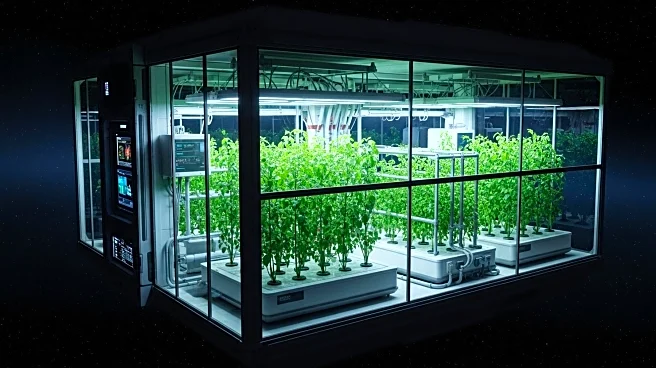What's Happening?
NASA has partnered with AeroFarms to conduct a vertical farming experiment aboard the International Space Station (ISS). This initiative aims to grow leafy greens under microgravity conditions, with early results indicating successful growth cycles and nutrient retention comparable to crops grown on Earth. The collaboration is part of a broader effort to advance space agriculture technologies, which include hydroponics, aeroponics, and controlled-environment agriculture. These technologies are crucial for sustainable food production during long-duration space missions and potential extraterrestrial colonization. The space agriculture market is projected to reach $13.4 billion by 2032, driven by increasing interest in human space exploration and the need for reliable food supplies for astronauts.
Why It's Important?
The development of space agriculture is vital for ensuring food security in space missions, particularly as interest in lunar and Mars exploration grows. By enhancing crop yield and resilience in microgravity, these technologies can support human survival and enable sustainable living in extraterrestrial environments. The collaboration between NASA and AeroFarms exemplifies the integration of advanced agricultural techniques with space exploration, potentially leading to breakthroughs in food production and resource management. This initiative also highlights the role of private companies in accelerating innovation and commercialization in the space sector, contributing to the broader goal of establishing self-sustaining habitats in space.
What's Next?
Future steps in space agriculture include further experimentation with bioengineered seeds optimized for space conditions, as funded by Blue Origin. These seeds aim to enhance stress tolerance and growth rates under low gravity. Additionally, Orbital Farm Technologies is developing compact modular plant growth units for lunar and deep-space missions, integrating AI-controlled lighting and nutrient management. As research continues, partnerships between space agencies and commercial spaceflight companies are expected to expand experimental opportunities and infrastructure, paving the way for more comprehensive space agriculture systems.
Beyond the Headlines
The ethical and cultural implications of space agriculture are significant, as they challenge traditional notions of farming and food production. The integration of AI and automation in crop management raises questions about the role of human labor and decision-making in agriculture. Moreover, the potential for space agriculture to address food security issues on Earth, particularly in regions facing resource scarcity, presents an opportunity for global impact. As these technologies evolve, they may also influence public policy and societal attitudes towards sustainable agriculture and space exploration.









